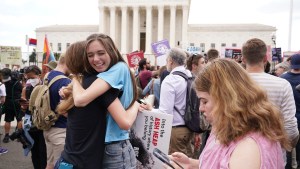Abortions can resume in Texas, a state judge ruled on Tuesday.
It’s one of several setbacks pro-lifers are facing, even in the wake of the Supreme Court’s June 24 ruling overturning Roe v. Wade.
Judge Christine Weems in Harris County blocked officials from enforcing a nearly century-old ban that the state’s Republican attorney general said was back in effect after Friday’s Dobbs v. Jackson decision overturning Roe. A hearing is scheduled for July 12 to consider the matter further.
As Americans reacted with a whole range of emotions and opinions to the 5-4 Dobbs ruling, legal challenges to state laws – where Dobbs said decisions on abortion’s legality rightly belong – were set in motion. Almost immediately – on Saturday – the American Civil Liberties Union of Arizona filed an emergency motion seeking to block the state’s fetal personhood law. The 2021 statute made abortion illegal if it’s sought because of a genetic abnormality. It also added a personhood provision that says the state will interpret all laws to confer the rights of people on unborn children, subject to the Constitution and U.S. Supreme Court rulings. The law was set to take effect in September.
In Tennessee, meanwhile, a federal appeals court on Tuesday cleared the way for a six-week ban to take effect. But in other states, pro-life legislation was under pressure.
Utah and Louisiana are two states that earlier had enacted “trigger laws” that would ban abortion when the high court overturned Roe, or within a month. On Monday, a Utah judge blocked that state’s near-total ban on abortion from going into effect for 14 days, giving courts more time to consider a legal challenge to the statute. Planned Parenthood is challenging the law, saying it violates the state constitution’s equal protection and privacy provisions. The law bans abortion, with exceptions to preserve the life or health of the mother, for fatal fetal abnormalities, and for rape or incest.
In Louisiana, activists argued that the state’s trigger law is unclear, leading a judge in New Orleans to temporarily block enforcement. A July 8 hearing will take up the matter further, but for now at least one clinic is continuing to perform abortions in the state.
Louisiana Attorney General Jeff Landry vowed to fight the ruling and enforce the law, tweeting on Monday: “We would remind everyone that the laws that are now in place were enacted by the people through State Constitutional Amendments and the LA Legislature.”
But the plaintiffs contend Louisiana now has multiple, conflicting trigger mechanisms in the law, according to the Associated Press.
“They also argue that state law is unclear on whether it bans an abortion prior to a fertilized egg implanting in the uterus,” AP reported. “And while the law provides an exception for ‘medically futile’ pregnancies in cases of fetuses with lethal abnormalities, the plaintiffs noted the law gives no definition of the term.”
In South Carolina, however, a federal court lifted its prior hold on an abortion law that allows the state to ban the procedure after an ultrasound detects a heartbeat, usually around six weeks gestation. There are exceptions for rape, incest or if the woman’s life is in danger.
And on Monday, abortion rights advocates asked a Florida judge to block a new state law that bans abortion after 15 weeks gestation, with no exceptions for rape, incest or human trafficking (there are some exceptions to save a mother’s life or if the fetus has a fatal abnormality, however). The ACLU of Florida argued that the law violates the state’s Constitution. A ruling is expected on Thursday, a day before the law was supposed to go into effect.
Also on Monday, abortion rights activists filed court challenges against new laws in Texas, Idaho, Kentucky and Mississippi – the state from which the Dobbs challenge originated.


